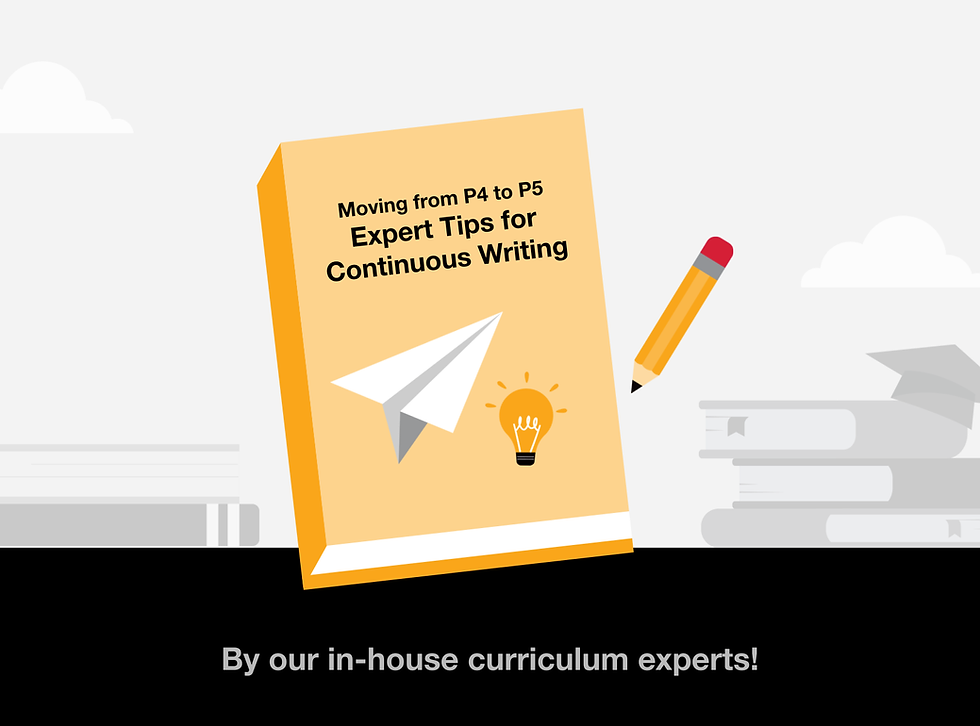✏ Score in the PSLE: Comprehension Cloze 💯
- Sep 18, 2018
- 3 min read
Updated: Sep 23, 2025

Score in the PSLE: Comprehension Cloze
In the comprehension segment of Paper 2, many children continue to be baffled by the cloze section. This component of the English Paper 2 is considered to be one of the most challenging sections because it is a test of many skills. The comprehension cloze questions not only test a child’s vocabulary, but also their grammar and ability to identify contextual clues. Since it makes up a total of 15 marks (out of 95 marks) in Paper 2, it is imperative that your child does well in this section to attain an ideal grade in the examination. If your child has missed the opportunity to attend our ET Boot Camp, which covered a range of skills and strategies to tackle Papers 1 and 2, fret not! We have summarised some important points below.
WITH AN ACE UP THEIR SLEEVE, YOUR CHILD CAN DO WELL!
Naturally, children who have a limited vocabulary may regard this section as an uphill task. However, there are some quick hacks which they can adopt to ensure maximum success. Here’s what your child needs to know to best represent themselves in the exam situation.
POINT 1 )
KNOW WHAT YOU ARE TESTED ON
Common question types in the cloze passage section include:
Pronoun to replace a noun or noun phrase
Phrasal verb
Preposition
Direct clue
Adverb
Conjunction to show contrast
Idiomatic expression
Word collocation
POINT 2 ) BEFORE ATTEMPTING THE QUESTIONS, READ THE PASSAGE
It is common for students to fill in the answers for the comprehension cloze rashly at the first reading of the passage. This is not recommended as it results in common mistakes such as:
Misinterpreting ideas presented in the passage.
Not following the sequence of ideas in the passage.
Not being able to pick out relevant contextual clues.
POINT 3 ) CONTEXTUAL INFORMATION IS KEY!
Students need to understand the context of the given passage to be able to glean contextual clues that will help them fill in the missing words. 1. Clues may appear before or after the blank. 2. Reading the passage carefully will allow your child to identify contextual clues that will help them decide on the most suitable word to use. 3. A strong understanding of grammatical rules can also help your child determine the answer. For example, is it a noun, adjective, adverb or verb? 4. Familiarising your child with the following language components can also give them an advantage in this section:
Phrasal verbs
Idiomatic expressions
Word collocations
Prepositions
Adverbs
POINT 4 )
QUICK LOOK AT A SAMPLE QUESTION
Do you watch television regularly? How much time do you _____(1)______ on it? As fun as watching television may seem to be, getting carried away doing it is _____(2)______ from uncommon. Fortunately, it can be easily controlled if you enjoy this recreational activity in a conscientious _____(3)______. Tips to arriving at the answers:
Based on the contextual information, the answer must be a verb. Change the question into an answer. I (verb) one-hour watching television.
Know your word collocations – far from uncommon.
Enjoy (verb) this recreational activity in a conscientious manner / way (phrase based on contextual information)
How can I be involved in my child's revision?

If you are thinking about taking a more active role in your child’s revision, consider these tips:
Identify your child’s learning preferences. Is he / she a kinesthetic, auditory or visual learner?
Get them to 'teach' it. Having your child explain the concepts they have learnt is one effective way to ensure they have understood what was taught, and will deepen their retention of ideas.
Consult YouTube. The majority of kids enjoy spending time on YouTube. Why not leverage on their interests and introduce them to some short educational videos that may benefit their learning?
Mix up the routine. One effective way to sustain your child’s interest in revision is to add some variety to their revision timetable. Without a dull moment, it will be easier for them to be proactive and take charge of their learning.
Provide a conducive environment for revision. Work with your child and help them create an environment that is ideal for learning.



